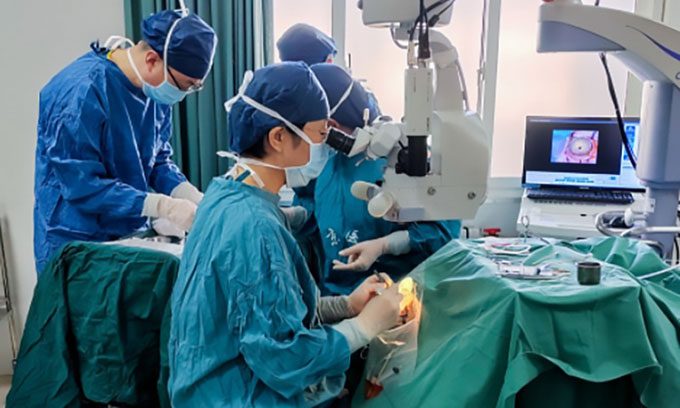Scientists at the Xi’an Jiaotong University Medical Center have successfully transplanted multiple organs from a genetically modified pig into four monkeys, three of which have survived to date.
During a 14-hour surgery on October 16, a team of 20 specialists performed liver, kidney, heart, cornea, skin, and bone transplants from a genetically modified pig into four monkeys at the Xi’an Jiaotong University Medical Center in Shaanxi Province, northwest China. As of November 1, three of the monkeys are in stable condition, while the fourth died on October 30.

Chinese scientists conducting organ transplants from pigs to monkeys on October 16. (Photo: CSTN)
This is the first time that multiple organs and tissues from a single mammal have been transplanted into multiple individuals of a different species simultaneously, marking a significant advancement in organ transplantation research aimed at addressing the shortage of human organ donors, according to a statement from the Xi’an Jiaotong University Medical Center.
With advancements in surgical techniques, experts note that organ transplantation has become a standard treatment method for many diseases, improving long-term survival rates and the quality of life for patients.
However, the shortage of human donors has severely limited the development of life-saving medical procedures. According to experts, genetically modified pigs are considered the most ideal source for xenotransplantation (the transplantation of living cells, tissues, and organs from one species to another).
The success of the latest surgery expands the clinical applications of xenotransplantation and provides scientific data to address the shortage of organ donations, according to Professor Dou Kefeng at the Xi’an Jiaotong University Medical Center, the lead surgeon of the operation.
Dou stated that the genetically modified pig had three genes removed to prevent organ rejection in the recipient animals. Additionally, three human genes were added to the pig’s genome to address any blood-related disorders and reduce damage to the transplanted organs.
Nevertheless, there are still many challenges in applying xenotransplantation to human organ transplants. Gene editing needs to be precisely designed to meet the requirements of different organs, and additional immunosuppressive drugs will be necessary for recipients, which could increase side effects. Some important immunosuppressants used in animal trials have not yet been approved for clinical use in humans.
There are also concerns about whether bacteria, viruses, fungi, and parasites from pigs could infect humans and cause disease, although evidence suggests that such issues can be avoided.
“If patients have better treatment options, they may not be suitable for such clinical trials,” Dou added that more experiments on non-human primates should be conducted to gather comprehensive and stable data, aiming to develop the most ideal gene editing and immunosuppression protocols.
“Xenotransplantation not only expands the source of organ and tissue donations but also represents a significant breakthrough in medical development. It will promote the advancement of many new biotechnologies and ultimately benefit humanity,” Dou emphasized.
In September 2021, researchers at New York University transplanted a kidney from a genetically modified pig into a clinically brain-dead patient with the family’s consent. The kidney functioned for 54 hours without signs of rejection from the body. That same year, several pig-to-human kidney transplant trials were also conducted in the United States.
In January 2022, a 57-year-old man received a genetically modified pig heart in an unprecedented surgery at the University of Maryland Medical Center. However, he died two months after the operation.



















































